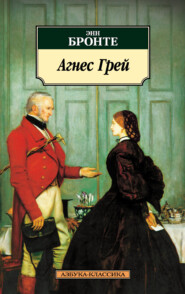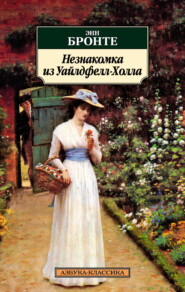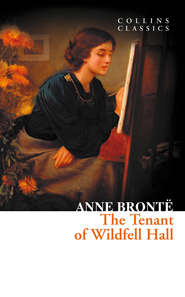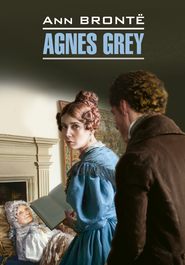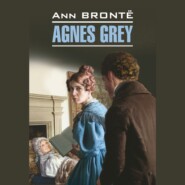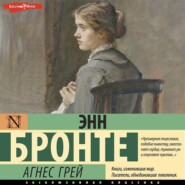По всем вопросам обращайтесь на: info@litportal.ru
(©) 2003-2025.
✖
The Tenant of Wildfell Hall
Настройки чтения
Размер шрифта
Высота строк
Поля
'Arthur,' said his mother, 'tell him to come in. Go on, Richard.'
There was a touch of sadness as well as coldness in her voice, but I knew not to what to ascribe it. The carriage drove on and entered the gates before us. My little companion led me up the park, discoursing merrily all the way. Arrived at the hall-door, I paused on the steps and looked round me, waiting to recover my composure, if possible – or, at any rate, to remember my new-formed resolutions and the principles on which they were founded; and it was not till Arthur had been for some time gently pulling my coat, and repeating his invitations to enter, that I at length consented to accompany him into the apartment where the ladies awaited us.
Helen eyed me as I entered with a kind of gentle, serious scrutiny, and politely asked after Mrs. Markham and Rose. I respectfully answered her inquiries. Mrs. Maxwell begged me to be seated, observing it was rather cold, but she supposed I had not travelled far that morning.
'Not quite twenty miles,' I answered.
'Not on foot!'
'No, Madam, by coach.'
'Here's Rachel, sir,' said Arthur, the only truly happy one amongst us, directing my attention to that worthy individual, who had just entered to take her mistress's things. She vouchsafed me an almost friendly smile of recognition – a favour that demanded, at least, a civil salutation on my part, which was accordingly given and respectfully returned – she had seen the error of her former estimation of my character.
When Helen was divested of her lugubrious bonnet and veil, her heavy winter cloak, &c., she looked so like herself that I knew not how to bear it. I was particularly glad to see her beautiful black hair, unstinted still, and unconcealed in its glossy luxuriance.
'Mamma has left off her widow's cap in honour of uncle's marriage,' observed Arthur, reading my looks with a child's mingled simplicity and quickness of observation. Mamma looked grave and Mrs. Maxwell shook her head. 'And aunt Maxwell is never going to leave off hers,' persisted the naughty boy; but when he saw that his pertness was seriously displeasing and painful to his aunt, he went and silently put his arm round her neck, kissed her cheek, and withdrew to the recess of one of the great bay-windows, where he quietly amused himself with his dog, while Mrs. Maxwell gravely discussed with me the interesting topics of the weather, the season, and the roads. I considered her presence very useful as a check upon my natural impulses – an antidote to those emotions of tumultuous excitement which would otherwise have carried me away against my reason and my will; but just then I felt the restraint almost intolerable, and I had the greatest difficulty in forcing myself to attend to her remarks and answer them with ordinary politeness; for I was sensible that Helen was standing within a few feet of me beside the fire. I dared not look at her, but I felt her eye was upon me, and from one hasty, furtive glance, I thought her cheek was slightly flushed, and that her fingers, as she played with her watch-chain, were agitated with that restless, trembling motion which betokens high excitement.
'Tell me,' said she, availing herself of the first pause in the attempted conversation between her aunt and me, and speaking fast and low, with her eyes bent on the gold chain – for I now ventured another glance – 'Tell me how you all are at Linden-hope – has nothing happened since I left you?'
'I believe not.'
'Nobody dead? nobody married?'
'No.'
'Or – or expecting to marry? – No old ties dissolved or new ones formed? no old friends forgotten or supplanted?'
She dropped her voice so low in the last sentence that no one could have caught the concluding words but myself, and at the same time turned her eyes upon me with a dawning smile, most sweetly melancholy, and a look of timid though keen inquiry that made my cheeks tingle with inexpressible emotions.
'I believe not,' I answered. 'Certainly not, if others are as little changed as I.' Her face glowed in sympathy with mine.
'And you really did not mean to call?' she exclaimed.
'I feared to intrude.'
'To intrude!' cried she, with an impatient gesture. 'What – ' but as if suddenly recollecting her aunt's presence, she checked herself, and, turning to that lady, continued – 'Why, aunt, this man is my brother's close friend, and was my own intimate acquaintance (for a few short months at least), and professed a great attachment to my boy – and when he passes the house, so many scores of miles from his home, he declines to look in for fear of intruding!'
'Mr. Markham is over-modest,' observed Mrs. Maxwell.
'Over-ceremonious rather,' said her niece – 'over – well, it's no matter.' And turning from me, she seated herself in a chair beside the table, and pulling a book to her by the cover, began to turn over the leaves in an energetic kind of abstraction.
'If I had known,' said I, 'that you would have honoured me by remembering me as an intimate acquaintance, I most likely should not have denied myself the pleasure of calling upon you, but I thought you had forgotten me long ago.'
'You judged of others by yourself,' muttered she without raising her eyes from the book, but reddening as she spoke, and hastily turning over a dozen leaves at once.
There was a pause, of which Arthur thought he might venture to avail himself to introduce his handsome young setter, and show me how wonderfully it was grown and improved, and to ask after the welfare of its father Sancho. Mrs. Maxwell then withdrew to take off her things. Helen immediately pushed the book from her, and after silently surveying her son, his friend, and his dog for a few moments, she dismissed the former from the room under pretence of wishing him to fetch his last new book to show me. The child obeyed with alacrity; but I continued caressing the dog. The silence might have lasted till its master's return, had it depended on me to break it; but, in half a minute or less, my hostess impatiently rose, and, taking her former station on the rug between me and the chimney corner, earnestly exclaimed -
'Gilbert, what is the matter with you? – why are you so changed? It is a very indiscreet question, I know,' she hastened to add: 'perhaps a very rude one – don't answer it if you think so – but I hate mysteries and concealments.'
'I am not changed, Helen – unfortunately I am as keen and passionate as ever – it is not I, it is circumstances that are changed.'
'What circumstances? Do tell me!' Her cheek was blanched with the very anguish of anxiety – could it be with the fear that I had rashly pledged my faith to another?
'I'll tell you at once,' said I. 'I will confess that I came here for the purpose of seeing you (not without some monitory misgivings at my own presumption, and fears that I should be as little welcome as expected when I came), but I did not know that this estate was yours until enlightened on the subject of your inheritance by the conversation of two fellow-passengers in the last stage of my journey; and then I saw at once the folly of the hopes I had cherished, and the madness of retaining them a moment longer; and though I alighted at your gates, I determined not to enter within them; I lingered a few minutes to see the place, but was fully resolved to return to M– without seeing its mistress.'
'And if my aunt and I had not been just returning from our morning drive, I should have seen and heard no more of you?'
'I thought it would be better for both that we should not meet,' replied I, as calmly as I could, but not daring to speak above my breath, from conscious inability to steady my voice, and not daring to look in her face lest my firmness should forsake me altogether. 'I thought an interview would only disturb your peace and madden me. But I am glad, now, of this opportunity of seeing you once more and knowing that you have not forgotten me, and of assuring you that I shall never cease to remember you.'
There was a moment's pause. Mrs. Huntingdon moved away, and stood in the recess of the window. Did she regard this as an intimation that modesty alone prevented me from asking her hand? and was she considering how to repulse me with the smallest injury to my feelings? Before I could speak to relieve her from such a perplexity, she broke the silence herself by suddenly turning towards me and observing -
'You might have had such an opportunity before – as far, I mean, as regards assuring me of your kindly recollections, and yourself of mine, if you had written to me.'
'I would have done so, but I did not know your address, and did not like to ask your brother, because I thought he would object to my writing; but this would not have deterred me for a moment, if I could have ventured to believe that you expected to hear from me, or even wasted a thought upon your unhappy friend; but your silence naturally led me to conclude myself forgotten.'
'Did you expect me to write to you, then?'
'No, Helen – Mrs. Huntingdon,' said I, blushing at the implied imputation, 'certainly not; but if you had sent me a message through your brother, or even asked him about me now and then – '
'I did ask about you frequently. I was not going to do more,' continued she, smiling, 'so long as you continued to restrict yourself to a few polite inquiries about my health.'
'Your brother never told me that you had mentioned my name.'
'Did you ever ask him?'
'No; for I saw he did not wish to be questioned about you, or to afford the slightest encouragement or assistance to my too obstinate attachment.' Helen did not reply. 'And he was perfectly right,' added I. But she remained in silence, looking out upon the snowy lawn. 'Oh, I will relieve her of my presence,' thought I; and immediately I rose and advanced to take leave, with a most heroic resolution – but pride was at the bottom of it, or it could not have carried me through.
'Are you going already?' said she, taking the hand I offered, and not immediately letting it go.
'Why should I stay any longer?'
'Wait till Arthur comes, at least.'
Only too glad to obey, I stood and leant against the opposite side of the window.
'You told me you were not changed,' said my companion: 'you are – very much so.'
'No, Mrs. Huntingdon, I only ought to be.'
'Do you mean to maintain that you have the same regard for me that you had when last we met?'
'I have; but it would be wrong to talk of it now.'
'It was wrong to talk of it then, Gilbert; it would not now – unless to do so would be to violate the truth.'
I was too much agitated to speak; but, without waiting for an answer, she turned away her glistening eye and crimson cheek, and threw up the window and looked out, whether to calm her own, excited feelings, or to relieve her embarrassment, or only to pluck that beautiful half-blown Christmas-rose that grew upon the little shrub without, just peeping from the snow that had hitherto, no doubt, defended it from the frost, and was now melting away in the sun. Pluck it, however, she did, and having gently dashed the glittering powder from its leaves, approached it to her lips and said:
'This rose is not so fragrant as a summer flower, but it has stood through hardships none of them could bear: the cold rain of winter has sufficed to nourish it, and its faint sun to warm it; the bleak winds have not blanched it, or broken its stem, and the keen frost has not blighted it. Look, Gilbert, it is still fresh and blooming as a flower can be, with the cold snow even now on its petals. – Will you have it?'






